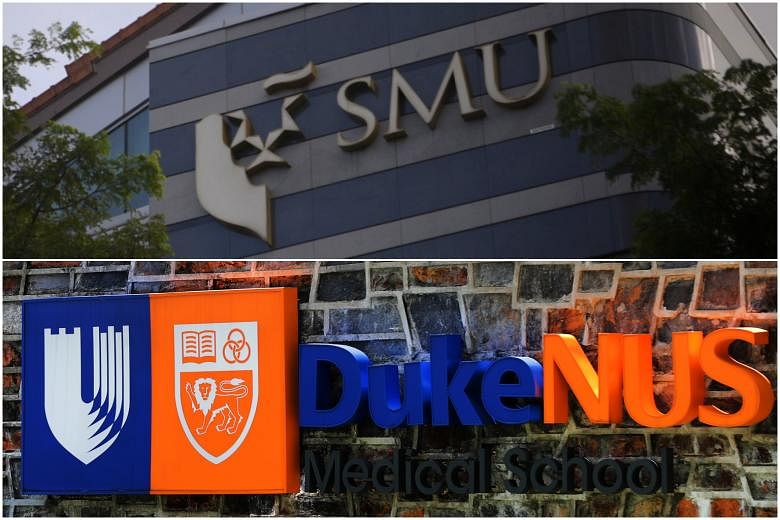SINGAPORE -The Singapore Management University (SMU) is collaborating with graduate medical school Duke-NUS to nurture doctors who are also skilled in areas such as law, business and computing.
Under this arrangement, students will pursue a four-year undergraduate programme to get a bachelor's degree at SMU, and gain conditional admission to Duke-NUS' Doctor of Medicine (MD) programme, which will run over another four years.
The two institutions signed an agreement on Friday (Feb 28) afternoon.
This is Duke-NUS' fifth such collaboration, the other four being with Duke University, the Singapore University of Technology and Design, Yale-NUS Liberal Arts and the National University of Singapore.
While undertaking their undergraduate studies at SMU, students will be mentored and involved in enrichment activities at Duke-NUS to prepare them for the MD programme.
For one, a pre-medical course will give them foundation knowledge, skills and attitudes to help them in their clinical and scientific training.
A summer programme has also been designed by Duke-NUS to provide insights into graduate-entry medicine, the roles of medical professionals and medical practice in Singapore; while a shadowing programme will pair students with a Duke-NUS faculty member and practising doctor.
Other activities include workshops on medical specialities, advising sessions with Duke-NUS faculty members, and community projects.
Students will also have the opportunity to observe how Duke-NUS students and faculty members train within the SingHealth Duke-NUS Academic Medical Centre.
SMU provost Timothy Clark said: "Increasingly, societal challenges have become multi-dimensional, and solutions are often to be found at the intersections of different disciplines.
"We are confident that graduates of this pathway will be equipped with the skills to contribute meaningfully to tackle the healthcare challenges of today and in the future."
Dean of Duke-NUS Thomas Coffman added that the new pathway will allow students to "become adept at channelling their varied interests towards shaping the future of healthcare with precision and agility".
Some requirements for the final acceptance of conditionally admitted students include successfully graduating from SMU with a strong cumulative grade point average (GPA), and doing well in the Medical College Admissions Test examination prior to entry into the Duke-NUS medicine programme.
Duke-NUS said it regularly reviews what constitutes a strong GPA, but added that the MD class that matriculated last year had achieved a GPA above 3.6 on average.
Applicants to SMU's undergraduate courses were informed of this new MD programme last year.
First-year SMU information systems student Geraldine Lee, 20, who has been accepted into this new route, said she is interested in both computing and medicine, and found it difficult to decide between the two.
Said Ms Lee: "The field of medicine will continue to develop with technological advancements. I hope that the technical knowledge I gain from studying computing at SMU would help me better adapt to such changes in the field."
For example, she is thinking of exploring a new information system in hospitals to improve patient care, and to use her management skills from SMU to improve business processes in hospitals and make them more efficient.
While the Duke-NUS MD programme will take an additional four years, as compared to her undergraduate peers in SMU, Ms Lee said she sees it as an investment that will "not only open more doors for me, but will also allow me to pursue something I will enjoy".
First-year law student Maxine Hong, who has also been accepted, said law and medicine are intertwined, citing the principles of informed consent as an example.
"Understanding the relationship between the two fields is crucial to ensure a healthcare ecosystem of the future that is able to meet the evolving needs of society," said the 20-year-old.


